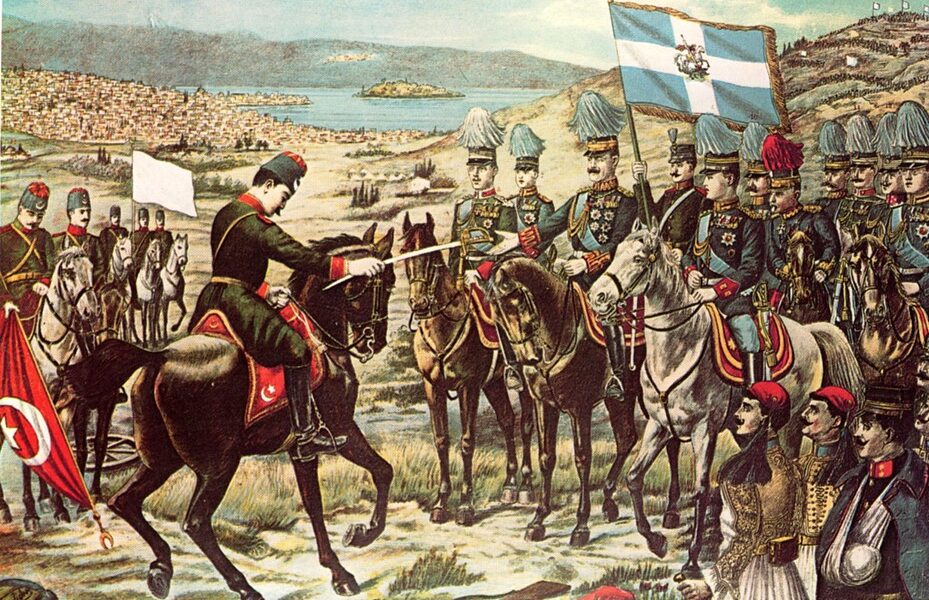
On this day in 1913, the Balkan League, consisting of Greece, Bulgaria, Serbia and Montenegro, utterly defeated the Ottoman Empire, nearly expelling the Turks entirely from Europe.

Montenegro, the smallest country in the Balkan League, was the first to declare war against the Ottoman Empire on October 8, with the other members not declaring war until October 17.
Bulgaria committed over 450,000 men to the war effort, Serbia 230,000, Montenegro 44,500 and Greece 125,000. Because Greece committed the least amount of men to the war effort of the three main allies, it was unjustifiably considered the weakest, but was soon to prove why it was the most important of all the allies.
The Greek ambassador to the Bulgarian capital of Sofia said "Greece can provide 600,000 men for the war effort. 200,000 men in the field, and the fleet will be able to stop 400,000 men being landed by Turkey between Thessaloniki and Gallipoli," ie. from Asia to Europe.

Staying true the promise, only four days after the war began, Rear Admiral Pavlos Kountouriotis liberated the island of Lemnos, allowing for Greece to blockade the Dardanelles and prevent Ottoman forces in Asia Minor to cross into Europe to reinforce their battle fronts in the Balkans.
Between November 1912 and January 1913, the Greek Navy had also liberated Imbros, Thasos, Agios Efstratios, Samothrace, Psara, Ikaria, Lesvos and Chios, with Samos liberated in March. The islands were liberated quickly as the Ottoman Navy could not match the dominant Greek navy that has never lost a battle since its modern establishment in 1821.
The Greek Navy imposed a blockade on the Ottoman Empire coast stretching from the Dardanelles to Suez in Egypt, which restricted supplies from arriving and locked in 250,000 Ottoman troops in Asia who were unable to reach the battles in Europe.
In particular, the Greek Averof ship became a nightmare for the Ottoman navy and single handedly won many battles.
Commander of the Second Bulgarian Army, General Ivanov, said that "the activity of the entire Greek fleet and above all the Averof was the chief factor in the general success of the allies" - a tremendous effort considering the Greek military was considered the weakest by the Serbs and Bulgarians of the three main allies.
However, the immense achievement by the Greeks at sea was equally matched on land despite the Serbs and Bulgarians believing it would make little impact.
After breaking through Thessaly, the Greeks were in a race to reach Thessaloniki before the Bulgarians, who also claimed the city. The Greeks however won the race by just a single day, entering the city on November 9 after Ottoman commander, Hasan Tahsin Pasha, surrendered himself and his garrison, as well as 70 artillery pieces, 30 machine guns and 70,000 rifles, to the Greek Army.
The Greek Army then would continue to liberate large swathes of Macedonia and the entirety of Epirus. The rest of Macedonia was captured by Serbia and Bulgaria, while the majority of Thrace was captured by Bulgaria.
The Treaty of London ended the First Balkan War on this day in 1913, but the treaty also declared Albania to be an independent state, despite the Albanians not firing a single shot for their independence and in most cases supported the Ottomans.
The Greek Army were forced to withdraw from Northern Epirus, despite having a Greek-majority and an Albanian-minority in the region, and to this day, Northern Epirus remains a part of Albania despite still having a Greek-majority.
The First Balkan War saw 340,000 Ottomans, who were backed by the Germans and Austro-Hungarians, killed, wounded or captured, and 108,000 Balkan League soldiers killed or wounded. The Ottomans were nearly expelled entirely from Europe, and never once again became a threat to the European mainland.
Each of the Balkan League countries would see their territory significantly increase, while the Ottoman Empire as a result of the war lost 83% of their European territories and 69% of their European population.



